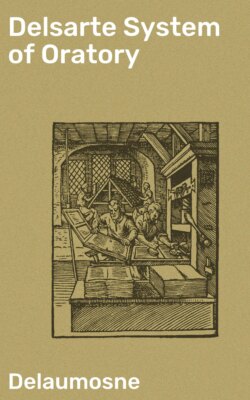Читать книгу Delsarte System of Oratory - Delaumosne - Страница 18
На сайте Литреса книга снята с продажи.
Of Slowness and Rapidity in Oratorical Delivery.
ОглавлениеThe third and last relation in which we shall study voice, is its breadth, that is, the measure or rhythm of its tones.
The object of measure in oratorical diction is to regulate the interval of sounds. But the length of the interval between one sound and another is subject to the laws of slowness and rapidity, respiration, silence and inflection.
Let us first consider slowness and rapidity, and the rules which govern them.
1. A hasty delivery is by no means a proof of animation, warmth, fire, passion or emotion in the orator; hence in delivery, as in tone, haste is in an inverse ratio to emotion. We do not glide lightly over a beloved subject; a prolongation of tones is the complaisance of love. Precipitation awakens suspicions of heartlessness; it also injures the effect of the discourse. A teacher with too much facility or volubility puts his pupils to sleep, because he leaves them nothing to do, and they do not understand his meaning. But let the teacher choose his words carefully, and every pupil will want to suggest some idea; all will work. In applauding an orator we usually applaud ourselves. He says what we were just ready to say; we seem to have suggested the idea. It is superfluous to remark that slowness without gesture, and especially without facial expression, would be intolerable. A tone must always be reproduced with an expression of the face.
2. The voice must not be jerky. Here we must keep jealous watch over ourselves. The entire interest of diction arises from a fusion of tones. The tones of the voice are sentient beings, who love, hold converse, follow each other and blend in a harmonious union.
3. It is never necessary to dwell upon the sound we have just left; this would be to fall into that jerky tone we wish to avoid.
